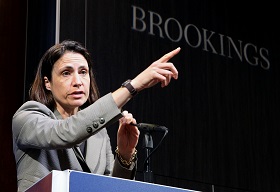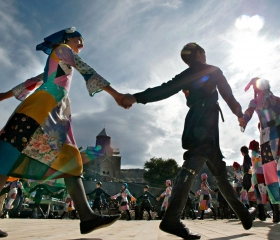(no votes) |
(0 votes) |
Ph.D in History, Leading Research Fellow at MGIMO University, Editor-in-Chief of International Analytics Magazine, RIAC Expert
In July 2015, the well-known Brookings Institution think tank in the United States published a report entitled “Retracing the Caucasian Circle” that explores ways to increase the West’s role in regional political processes. The United States, the European Union and Turkey are seen as three interconnected Western forces. Although the authors of the report, Fiona Hill, Kemal Kirişci and Andrew Moffatt, do not claim that it is “an in-depth research synthesis or a detailed policy analysis” and call it just a “sketch” for further consideration and discussion, they see their prime task in advancing “some recommendations for framing future policy.” Naturally, they are not talking about policy in general, but Western interests.
First, there are unresolved conflicts, especially the stand-off over Nagorno-Karabakh, which has seen a growing number of armed incidents in recent months (not only on the contact line between the sides, but also on the border between Armenia and Azerbaijan outside the conflict region) [1]. By comparison, the situation in Abkhazia and South Ossetia looks relatively calm. The two partially recognised republics have received military and political guarantees, as well as and socioeconomic aid from Russia. Meanwhile Georgia is not making any moves to establish its jurisdiction over Sukhumi and Tskhinvali, despite the official rhetoric about restoring territorial integrity as a key priority. It has to be admitted that the Abkhazian and South Ossetian choice has strengthened Tbilisi’s ties with the United States, NATO and the European Union. The “Georgian Dream” government, far from revising the pro-Western vector of the Saakashvili presidency, has indeed reinforced it. South Ossetia’s “borderisation” actions, backed by Moscow, fuel Georgian and Western fears that Russia will advancing into Georgian territory proper (link in Russian).
Russia and the United States still see the South Caucasus as an area of geopolitical rivalry, with the events in Ukraine throwing a sidelight on but not cancelling the fact.
Third, new problems and challenges have appeared. We are talking here, above all, about the threat from the Islamic State (IS). Formerly, Jihadist groups in the Middle East, such as Al-Qaeda, did not declare the Caucasus to be a sphere of its interests or a priority region. But such a statement was made by IS representatives in the summer of 2014: today many of its leaders come from the Caucasus.
The Brookings report focuses on disputes and contradictions in the Caucasus.
In this respect, the Brookings report is of great interest. Written at a time when the confrontation between Russia and the West has been at its fiercest since the end of the Cold War, it is devoted to a region which has been overshadowed by other political upheavals. To what extent do these events influence the authors’ approach?
The Caucasus as Part of Western Priorities

Caucasian Circle: Considerations and constraints
for U.S., EU, and Turkish engagement in the
South Caucasus
The report’s value derives first and foremost from the remarks about the Western perception of the Caucasus. How much of a priority is it for the three Western actors mentioned above? The authors are quite candid on the issue: “The concept of a South Caucasus unambiguously oriented towards Euro-Atlantic integration has eroded since the 1990s,” and the regional elites in the three independent states “have become genuinely cynical about Western intentions and capabilities after the failure of past policy initiatives.” The report says that for the United States and its European allies the Caucasus states have become a “second-tier” issue closely connected to “first-tier” problems. What then are the first-tier problems?
The report says that for the United States and its European allies the Caucasus states have become a “second-tier” issue closely connected to “first-tier” problems.
Fiona Hill, Kemal Kirişci and Andrew Moffatt have no time for explanatory models. And yet identifying the Western initiatives that the authors have in mind and the people responsible for the setbacks are no idle tasks. The authors believe that the West has not been sufficiently engaged in regional processes. Again, the question hangs in the air: what exactly is enough and, most importantly, what are the obstacles to engagement? Unfortunately, the ideological assumption that Western engagement in the Caucasus is right leaves aside reflections on what it had previously failed to achieve and why. One may agree with the authors’ thesis that the report does not claim to provide “in-depth research synthesis”. Otherwise, the progressivist logic whereby more active Western engagement in the region is identified with stabilisation and conflict resolution would have to be called into question.

Co-author of the report, Fiona Hill.
Thus, in the West the Caucasus is perceived not on its own merits, but as part of broader geopolitical puzzles. To these one could add the question of recognising the genocide of Armenians that the U.S. establishment raises from time to time in order to exert pressure on an obstinate Ankara, whose interests by no means always coincide with the American approach. If one looks at the special relations between Turkey and Abkhazia, Ankara, while recognising the territorial integrity of Georgia, has never closed the Abkhazian window for its businesspeople and representatives of the Abkhazian diaspora (link in Russian). The report speaks of Turkey as a pro-Western force, and there again ideological biases prevent the consideration of the whole complex and contradictory nature of relations between the United States and its NATO allies, not to speak of relations with Russia.
Russia and the Caucasus through the "Crimean Lens"
Can relations in the Caucasus be built without Russia and without taking its interests into account? The authors rightly assume that Russia is a kind of “primary starting point for Western calculations about what is possible in creating a new set of regional initiatives.” However, instead of presenting a sound analysis of Russian motives or even an attempt to understand these motives, what we see is a tendency to accuse, although it is not as pronounced as in many other materials on the subject.
What the authors see as first-tier problems for the West are: “dealing with Russia’s recent actions in Ukraine, the ongoing U.S.-led negotiations with Iran over the future of its nuclear program; and the changes created by the upheavals in the Middle East.”.
If the authors had chosen to look into the issue, they might have moved closer to solving an important applied task: how can the West and Russia secure a mutually beneficial status quo in the turbulent region by minimising conflict-generating potential (both for the region and for the big powers)? Instead, regional Caucasian dynamics are seen through the “Crimean lens” (in conjunction with the 2014 case, which is very different from the dynamics of the conflicts in South Ossetia, Abkhazia and Nagorno-Karabakh).

Military Development in Transcaucasia:
an Arms Race?
It has to be noted that Moscow’s position on all these conflicts has evolved, depending on a wide spectrum of internal and external factors. One gets the impression that the authors are not interested in these processes because they are not so much looking for ways to live together, but for ways to increase Western engagement to which Russia is an obstacle. Hence the conclusion that, after the events of 2014, the regional elites in the Caucasus see Moscow as a force poised to interfere in their internal and foreign policy and economics. This thesis is at odds with another key conclusion the authors draw. One section in the report has the symbolic heading “End of a Region: Divergent Trends in the South Caucasus”. Indeed, Azerbaijan, Armenia and Georgia each gave their own answers to the rival ideas of European and Eurasian integration, and their attitudes to NATO and the Collective Security Treaty Organization (CSTO) [3]. If we recognise foreign policy diversification, it is hard to see a unity in the attitude of the region’s three countries to Russian policy. That would be a gross simplification to say the least.
Western Engagement in the Caucasus
Russia is bound to perceive the South Caucasus not as a “second-tier” region (or “the broader region around”) that influences first-tier matters, but as a foreign policy priority.
In any case, criticism of Russia’s foreign policy aspirations, or a reluctance to understand Moscow’s motivation, is not the most important thing. While they talk a lot about the West’s inadequacy and the need for greater engagement in the Caucasus, the authors do not say how the desired result can be achieved (preferably not by multiplying risks or “unfreezing” conflicts). How can we make up for the deficit? The report merely states that the United States, the European Union and Turkey do not have enough time or the necessary resources. Nor does it give due attention to potentially emerging threats. The report rightly states that recognition of Abkhazia and South Ossetia “changed the regional configuration”, but it does not show the dynamic of “unfreezing” in 2004–2008, an important element of which was the change of the status quo established in the region after the collapse of the USSR. In describing what the West can offer references are made to Armenian–Turkish normalisation, the role of the Obama Administration in that process (although the Zurich Protocols of October 2009 would have been impossible without Russia’s support), but not enough is said about the prospects.
Regional Caucasian dynamics are seen through the “Crimean lens”.
How will the West guarantee Armenia’s security without Russia, or with Russia in a diminished role? How much can the West help Georgia withstand the onslaught of IS? What are Tbilisi’s prospects of joining NATO considering that, since April 2008 (the time of the Bucharest Summit), it has made no progress in implementing the Membership Action Plan – even though it has passed democracy “tests” in the shape of the parliamentary, presidential and municipal elections held in 2012–2014? Could an acceleration of Georgia’s Euro-Atlantic advancement trigger a new confrontation with Russia?
While they talk a lot about the West’s inadequacy and the need for greater engagement in the Caucasus, the authors do not say how the desired result can be achieved.
The report notes that: “The reality of Russian economic, political, and security dominance cannot be ignored, but Russia’s position in the region will ultimately change as Iran and China move in. In short, to reengage successfully, the West will have to adapt its policies continually to reflect evolving economic, political, and, ultimately, strategic realities in the South Caucasus.” In short, the report calls for all the good things and opposes all the bad things. However, can Russian realities be taken into account without a proper understanding of Moscow’s motivation? How justified is the forecast that Iran and China will become stronger in the region? Their interests are far from obvious, especially in the case of China. Meanwhile, Tehran’s priority is the Middle East, and only then the South Caucasus.

Back to Georgian Wine and Cinema?
The report, which raises more questions than answers, is in many ways the logical result of a study based on numerous interviews with individuals and organizations in Washington, London, Ankara, Baku, Tbilisi, Yerevan and Berlin. But not in Moscow, which is the dominant force in the region (as the authors admit), the North Caucasus and the unrecognised republics, without which the picture cannot be complete. The list of recommended reading (apparently for practicing diplomats and experts) on the regional problems is of particular note. It contains practically no studies or reports by Armenian, Azeri, Georgian (with one exception) and Abkhazian scholars, not to mention Russian and Iran experts, who are keeping an equally watchful eye on the situation in the Caucasus. Only Western authors are recommended when it comes to Western politics.
***
For many years, U.S. scholars and politicians rightly and reasonably criticised Soviet social sciences for excessive didacticism, political bias and ideological intentions, which took precedence over empirical facts. Today these shortcomings are very much in evidence in American think tanks, which prefer wishful thinking to misguided actual politics, assessments based not on the whole complexity of the processes, but on progressivist logic. In accordance with that logic, wherever the West comes, it brings success, democracy and prosperity with it.
1. Late July – early August 2014 saw an escalation of military violence on a scale that exceeded all the previous ceasefire violations. On 12 November 2014, the armed forces of Azerbaijan shot down an Armenian Mi-24 military helicopter, killing three crew members died. The incident was the first case of the destruction of a military aircraft in the conflict zone since May 1994, with the exception of an Iranian military transport plane which had strayed from its course and was shot down (link in Russian).
2. Bertolt Brecht. The Caucasian Chalk Circle // Collected Works in 5 vols. Vol.4. Moscow, Iskusstvo Publishers, 1964 (in Russian).
3. Three South Caucasus countries responded to the Crimean case in different ways. Georgia ranged itself with Ukraine, but only joined sanctions against Crimea and Sebastopol (but not the other Western sanctions). Azerbaijan supported Ukraine’s territorial integrity, but voted against stripping Russia of its voting rights at the Parliamentary Assembly of the Council of Europe (PACE) and continued its economic cooperation with Russia, including the military sphere (arms supplies). A report about a telephone conversation between Vladimir Putin and Serzh Sargsyan on 19 March 2014 posted on the Armenian President’s website read: “In this context, the two men touched upon the situation after the referendum in Crimea and noted that it is another example of the people exercising their right to self-determination by the free expression of their will.”
(no votes) |
(0 votes) |




